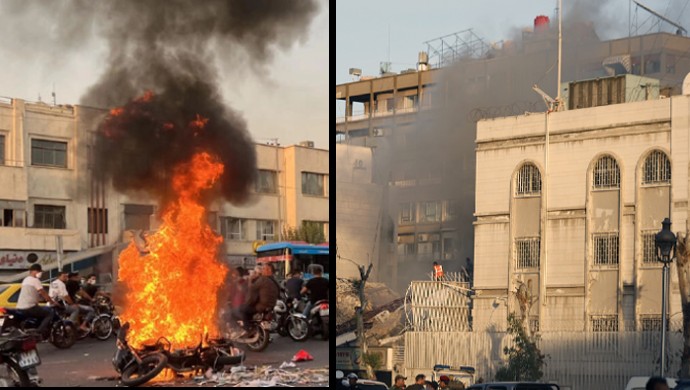In a period characterized by escalating tensions and geopolitical maneuvers, Iran finds itself at a crossroads, grappling with a growing popular resistance movement at home and the repercussions of setbacks in the region. The latest attack on Iranian regime targets in Syria has not only intensified scrutiny of Tehran’s strategic choices but has also exposed the deep chasm within the Iranian regime.
Since the popular uprisings of 2017 and 2019, and especially in 2022, regime Supreme Leader Ali Khamenei has found himself beleaguered by the growing discontent of the Iranian people and a resistance movement that is gaining traction and becoming more organized.
In an attempt to divert attention from his regime domestic conflicts, Khamenei has historically resorted to warmongering in the region and across the globe, a tactic he learned from his predecessor, Ruhollah Khomeini.
The regime’s interventions in the region and it fueling of the conflict in Gaza aims to provide a respite from Iran’s nationwide uprising in 2022, from which the regime has not yet fully recovered. However, this strategy has increased the Iranian people’s understanding of the regime’s manipulative positions and its abuse of the Palestinian cause and the suffering of the Palestinian people for its own evil ends.
Palestinian authorities have also highlighted the Iranian regime’s exploitation of the Palestinian struggle, emphasizing Tehran’s manipulation of regional conflicts for its political gains.
The recent attack on the Iranian consulate in Syria, which resulted in the death of several senior IRGC Quds Force commanders and officers, not only highlighted the regime’s weak state but also sparked a crisis within the regime, exposing the regime’s internal divisions.
On April 1, Mohammad Taqi Aqayan, an analyst for the regime’s strategic affairs at the Iranian TV network Ofogh, said. “Tonight, I believe that many of our people have not yet realized the depth of this tragedy” and repeated the regime’s pledges of “harsh revenge” for the death of its terrorist elements.
The regime’s failure to respond to foreign attacks led to an increase in disputes within the regime’s ranks. Aqayan said, “How long can we continue to appease?” as he called for a direct response, stressing that the current strategy reduces the regime’s regional influence and deterrent capabilities. “Now, the best course of action is to respond directly to the Zionist regime in the occupied Palestinian territories…” he said.
If the regime has not acted so far, it is not a sign of unwillingness, but rather of inability. The regime has banked on the West’s policy of appeasement to make threats and carry out terrorist attacks without suffering the repercussions. The regime knows that if it becomes involved in a foreign conflict, it will be lose hold on its main battleground, which is the streets of Iran, where it is fighting against millions of people who want regime change. In the current explosive state of Iran’s society, it will only take a spark to light the next anti-regime uprising. As the people chant in their protests, “Our enemy is right here,” a testament that they are not deceived by the regime’s attempts to create illusory enemies outside of the country’s borders.
Despite these challenges, Khamenei finds himself at an impasse, aware of the dangers of engaging in open conflict abroad. His attempts to use external conflict as a cover for internal issues have backfired, exposing the regime’s weaknesses and the ineffectiveness of its long-standing strategies.
For years, the regime has managed to divert domestic attention from its crises by exporting conflict and fostering regional tensions. However, he is now in a corner, unable to deceive his people or the peoples of the region, trapped in a quagmire of his own making.
In the wake of the attack, internal divisions within the clerical regime have become more apparent. Khamenei’s reluctance to retaliate indicates a deeper recognition of its precarious situation, both domestically and internationally. This incident not only underscores the fragility of the regime but also raises questions about its future strategic directions and its ability to deal with the complex interaction between internal popular resistance and external pressures.
The unfolding situation in Iran reveals a regime at a crossroads, facing a pivotal choice between escalation and restraint. Regardless of the choice Khamenei makes, one thing is for sure: the people and their Resistance movement will be ready to take the next leap toward freeing their country from the clutches of the evil regime of the mullahs.





